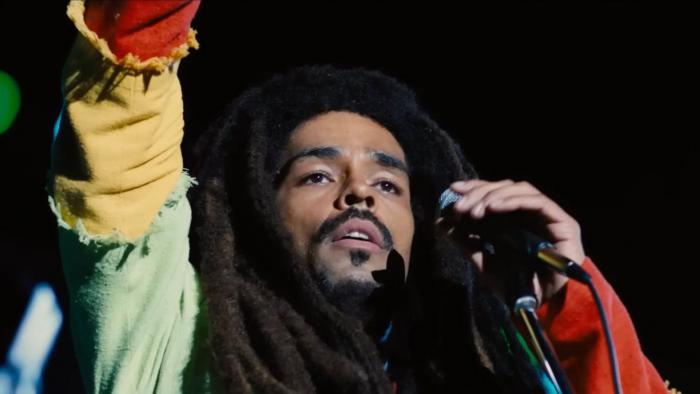

Review: How the Hell Did ‘One Love’ Make Bob Marley So Boring?
By Kayleigh Donaldson | Film | February 17, 2024 |
By Kayleigh Donaldson | Film | February 17, 2024 |

It’s 1976. As Jamaica faces a drastic increase in violence thanks to the warring political factions gearing up for an election, reggae musician Bob Marley (Kingsley Ben-Adir) and his band, The Wailers, are preparing for a peace concert. Two days beforehand, seven armed men raid his home and shoot him and his wife Rita (Lashana Lynch). He survives the attempted assassination but relocates to London for safety reasons. While there, the band composes their magnum opus while Marley deals with personal troubles, illness, and questions over his role as a musician and leader.
I’ve ranted a lot on this dear site about my issues with the biopic genre, particularly those focused on musicians. I find it to be a dishearteningly middlebrow and incurious form that the entertainment media has more interest in using as a means to sell records than tell an interesting story. These films, typically endorsed or produced by the artist or their estate, seem most concerned with strengthening a brand than adhering to the truth, even if it means turning some of the most beloved and charismatic figures of the past century into puppets for trailer-ready buzz phrases. It’s how we got Bohemian Rhapsody, an estate-endorsed score-settling session that managed to be both technically inept and morally reprehensible. Yet that movie also made $900 million, so it’s no surprise a slew of musical biopics followed in its path. Some were okay (Rocketman), but the default mode was boring, from Whitney Houston: I Wanna Dance With Somebody to All Eyez On Me. But they all had one job — get everyone to remember the music — and they succeeded on those depressingly limited terms.
I have no doubt that Bob Marley: One Love will encourage its viewers to pick up a few Marley records. There are certainly plenty of reminders during the film of the Wailers’ most memorable tunes, even if they’re deployed with the subtlety of a sledgehammer. The wobbly screenplay seems built around the necessity of shoehorning in as many songs as possible to the point of unintentional hilarity. After he has a fight with Rita (the one moment when the oft-documented discord of their relationship is even hinted at), we hear ‘No Woman, No Cry.’ A recording session montage, mixed in with the band hanging out and having a good time, is set to ‘Jammin.” A friend comes to plead for redemption from Marley, and guess what song he’s magically written in its entirety in the next scene? Go on, guess. It’s lazy storytelling but also reductive to make one of the greatest musicians of his era someone whose talent just appears to him without any commitment to the craft.
All of the problems with One Love are rooted in its status as a byproduct of an estate’s demands, of the staid biopic genre that has become only more limited in scope thanks to studio and record label control. Director Reinaldo Marcus Green, whose previous film King Richard also struggled with biopic-itis, seems stifled by this project. The script, co-written by Green, Terence Winter, Zach Baylin, and Frank E. Flowers (too many cooks), is set on rails, as though it used Walk Hard as its narrative guide. It makes the otherwise savvy choice to focus only on Marley’s life from 1976 onwards, but the flickers of flashbacks to his youth and early courtship of Rita cannot help but feel maddeningly incomplete. Marley is SHOT and the mental, political, and communal repercussions are barely touched upon. Indeed, Marley’s own religious and political activism are so watered down here that they barely register.
Marley is barely a person here, so sanded down has his history been for a film that seems more interested in him as a figure on a poster than a man who lived a fascinating, complicated life. This leaves Kingsley Ben-Adir with nothing to do beyond lip sync and smoke (accompanied by some wonky CGI pot clouds.) Here is a fabulously charming actor and noted scene-stealer, but he’s not a miracle worker (honestly, he gets a more satisfying character arc in Barbie.) Neither is Lashana Lynch, one of the most magnetic actresses working today saddled with the concerned spouse role this genre is too fond of. Rita Marley is worthy of her own biopic but here she exists solely to be sad about Bob and offer him bland platitudes when he’s feeling down. The first couple of reggae, collaborators and lovers whose relationship was mired in rape and abuse, are devoid of personality in every scene.
The version of Bob Marley that has become the stuff of merchandise and Instagram imagery is a dilution of the real thing, a cultural smudging that seems ideal to white audiences who think reggae is good music to get stoned to and nothing else. It’s sold a lot of records as well as dorm room posters and bongs, regardless of how the true message of Marley’s work gets bogged down by this. One Love is guilty of exacerbating the problem, of allowing Marley’s life and music to be little more than a sanitized platform for record industry profits. As now happens with all musical biopics, we see footage of the man himself talking and performing in front of adoring crowds, and it’s far more hypnotic than anything that the biopic could hope to convey. When Marley talks about money not concerning him, it’s hard not to laugh when you think about how much it clearly matters to the people behind this movie.
Bob Marley: One Love is now playing in theatres.
← Drama at the 'Today' Show as Kelly Rowland Walks Off Set Before Hosting Gig | 'Madame Web' Is a Burning Dumpster Dropped into a Volcano Filled with Moldy Fish →
More Like This
Spoilers: Netflix’s Korean Comedy 'Chicken Nugget' Is Getting Review-Bombed Over A Single Joke
How 'The Regime' and 'Palm Royale' Complicate Their Genres
Review: Dirty Beautiful Josh O'Connor Digs Up The Past In 'La Chimera'
How 'X-Men '97' Sidestepped Cyclops' Biggest Sin And Redeemed A Tragic Foe
Is 'Palm Royale' the New 'Desperate Housewives'? Not Even Close

Jenna Lyons Has Conditions For ‘Real Housewives’ Return
This Week On ‘Selling Sunset’: Irreconcilable Differences
Huey Lewis Was Inspired By 'Mamma Mia' For His Next 'Career Event'
Paramount+ Is Getting Cues From David Zaslav
Yorgos Lanthimos Reteams with Emma and Viggo Goes West In Three Trailers
Kristen Stewart Will Never Make an ‘Algorithmic’ Marvel Movie
More Like This
Spoilers: Netflix’s Korean Comedy 'Chicken Nugget' Is Getting Review-Bombed Over A Single Joke
How 'The Regime' and 'Palm Royale' Complicate Their Genres
Review: Dirty Beautiful Josh O'Connor Digs Up The Past In 'La Chimera'
How 'X-Men '97' Sidestepped Cyclops' Biggest Sin And Redeemed A Tragic Foe
Is 'Palm Royale' the New 'Desperate Housewives'? Not Even Close
Reviews